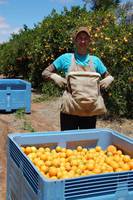Organic Farming Australia
Eating Organic
Organic farming refers to the practice of farming without using artificial fertilizers and pesticides; farmers instead use natural solutions such as green manure or compost, and techniques like companion planting and crop rotation to maintain soil productivity and control pests. When animal products (such as meat and eggs) are produced organically, the animals are fed one hundred per cent organic foods and are not given antibiotics or growth hormones.
Furthermore, organic foods are not filled with preservatives and additives before they hit the supermarket shelves. These chemicals are used to preserve their shelf life, which means that organic foods will not last as long as ordinary foods, but they will be free of harmful and unhealthy chemicals.
For environmental and health reasons, eating solely organic foods is a good idea. By supporting farmers who don’t spray chemicals in to the air, you are helping to save the environment and keep the air clean. While organic foods have no proven extra health benefits (i.e. they do not contain more vitamins or minerals that non organic foods), they are fresher, taste better and will not introduce chemicals (left in residue on food) into your system.
However, it’s not simple enough to say that only eating organic foods will save the environment. When it comes to organic foods, there are many other factors to consider. If the organic product is from overseas, the transportation could be harming the environment as much as the pesticides would have. Always buy local organic produce when you have the choice. Is it better to buy a local, non organic product as opposed to an organic product from overseas that has been transported to Australia? That choice is up to you.
The organic market, although popular, is a new one, so you may not be able to find an organic version of every food item you would like.
If you can’t eat organic, there are other ways that you can alter your food intake to help the environment – or, you could do these as well as eating organic.
- Try growing your own food. Tomatoes, strawberries, carrots and parsley are very easy to grow and don’t require much space. By growing your own fruit and vegetable, you’ll never have to worry about freshness or the impact that freight has had on the environment, plus, you’ll know exactly what’s going in to them.
- Always buy foods that are in season and produced as locally as possible (e.g. buy Australian seafood instead of Asian seafood, or buy fruit that has been grown in the same city.)
- Eat less processed food. The production of processed food is a drain on resources and unprocessed foods are much healthier. A simple way to know if something is overly processed is to look at the ingredients list on the side of the box – unprocessed foods will contain natural ingredients like meat, soy, herbs and spices, while processed foods will list ingredients like emulsifiers, preservatives and ‘imitation chicken flavouring.’
- This may sound obvious but it’s a mistake many people make – only buy what you need. Eating all the organic food in the world isn’t going to make a difference if you’re throwing half of it out each week.
- Keep a composter or organic waste bin handy and throw uneaten food in to it.



